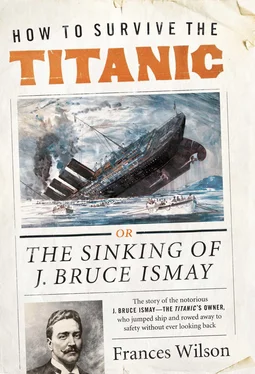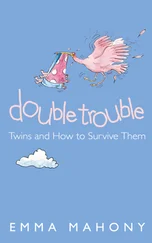That evening Ismay again requested permission to return home, promising that he would be replaced by an army of experts from Great Britain, including personnel from White Star and engineers from Harland & Wolff. Smith again refused. Ismay seemed to be pulling in opposing directions: on the one hand he stressed his willingness to help Smith, and on the other hand he talked of little else but leaving for England.
The acoustics in the Caucus Room had not been good enough to carry the often quiet voices of the survivors, and so on Tuesday 23 April, the inquiry moved once more, this time to the stern Committee on Territories conference room. During the last four days the proceedings had occupied four different premises, from a gilded hotel to a government office. Senator Smith’s settings were impersonating the drift of the age itself, from frivolity to seriousness. The new room was too small to contain spectators, but around 500 women who had been waiting since 9 a.m. nonetheless poured through the door and were forcibly removed by police officers. This process delayed the hearings by an hour, which allowed time for photographers to get some pictures of Ismay, before being hurled out by Smith.
Third Officer Pitman described how ‘crowds’ of ‘moaning’ victims froze to death in the water while those in the lifeboats ‘just simply lay there doing nothing’, and Frederick Fleet, the lookout who reported the iceberg, explained how he ‘had no idea of distances or spaces’ and that if the Titanic officers had not mislaid the binoculars he would have seen the iceberg in time. Comic relief came in the testimony of a Canadian first-class passenger, Major Peuchen, who, in the absence of a member of the crew, had volunteered to man a boat. Asked whether the ship went down by the ‘bow or the head’, Peuchen asked: ‘You mean “the head” by the bow, do you not?’
‘Exactly,’ said Smith.
‘It is the same thing,’ remarked Peuchen.
‘No,’ said Smith grandly. ‘Not the same thing.’
Ismay now suggested to Smith that if he was not currently needed to give evidence nor allowed to return to his wife and family, might he go to New York for a few days and get on with some work? While his request was not strictly denied, the committee ‘took no action’. Late that night, the Telegraph ’s man in Washington saw Ismay in Willard’s Hotel accompanied by Franklin, three lawyers and the officials of the IMM. ‘Despite his terrific experiences,’ the correspondent reported home, ‘including the scandalous and persistent onslaughts made on him through the editorials and cartoons of the Yellow Press, Ismay bears himself bravely. His eyelids looked red and swollen, as if through lack of sleep, but otherwise the chairman of the White Star Line was just as alert, erect and dapper as when I saw him last in England.’
At nine o’clock on the morning of Wednesday 24 April, while the throngs of onlookers gathered like pigeons around the Congressional buildings and cinematograph wheels prepared to whirl, Ismay knocked on Smith’s door and demanded to be put on the stand at once so that he could then sail to England. Smith impatiently dismissed him and opened the proceedings an hour and a half later with an announcement: ‘From the beginning until now there has been a voluntary, gratuitous, meddlesome attempt upon the part of certain persons to influence the course of the committee and to shape its procedures. The committee will not tolerate any further attempt on the part of anyone to shape its course. We will proceed in our own way, completing the official record.’ The newsmen pricked up their ears: who could the Senator be referring to? Meanwhile, the White Star offices in England and New York were receiving reports that the crew of the Olympic, currently in Southampton and waiting to sail on the same route as the Titanic, had mutinied. Immediately on landing, Ismay, advised by Franklin, had ordered the IMM to provide their ships with lifeboats to accommodate all passengers and crew; but where were these hundreds of surplus boats to come from? In the few days between his command and the Olympic ’s sailing, the White Star Line had only been able to get hold of what the Olympic ’s crew described as forty ‘rotten and unseaworthy’ collapsibles.
First to appear that day was twenty-nine-year-old Fifth Officer, Harold Lowe. Smith invited him to tell the story of his life, beginning with the time, aged fourteen, when he ran away to sea. ‘It is a pretty long story,’ Lowe laughed, and the audience craned their necks. ‘Here at last,’ reported the Telegraph, ‘came a unique opportunity of hearing at first hand what promised to be a thrilling tale of romance and reality of sea life. Mr Lowe was, however, disappointing.’ He described how he had spent seven years on schooners, then switched to sail, and finally earned his certificates on steamers. Lowe ‘missed the chance of a lifetime’, said the Telegraph, in reducing a ‘thrilling tale’ to a few facts, but the Titanic ’s Fifth Officer was one of the few British men who did emerge from his testimony a hero. He was celebrated in England for providing the best moment of the week so far: when Smith asked him of what an iceberg was composed, Lowe replied that it was composed of ‘ice’. In America he was celebrated for ‘cursing out’ Ismay, who had been ‘interfering’ with his duties. ‘Lower away! Lower away! Lower away! Lower away!’ Ismay shouted as Lowe was releasing one of the lifeboats on the starboard side. Lowe refused to repeat what he said in response to Ismay, whom he had not recognised. Ismay himself now interjected, and turned to Lowe. ‘Give us what you said.’ He then turned to Smith, ‘I have no objection to his giving it. It was not very parliamentary.’ If the Senator was concerned that the language might be offensive, Ismay suggested that ‘it be put on a piece of paper’ so that he could decide for himself. Lowe wrote it down and Smith read aloud: ‘If you get the hell out of that I might be able to do something.’ How did Ismay respond to Lowe’s insubordination, Smith wondered? He just walked to the next boat, said Lowe, ‘on his own hook, getting things ready there, to the best of his ability’. Concerned that he might have blown his future with the White Star Line, Lowe conceded that Ismay was clearly ‘anxious to get the people away and also to help me’. The following day various US papers suggested that towns called Ismay in Texas and Montana should change their names, perhaps to Astor but preferably to Lowe, in honour of the officer who had told Ismay to ‘go to hell’.
Smith now recalled Lightoller, who made a statement taking full responsibility for the ‘Yamsi’ messages sent on the Carpathia. Lightoller described Ismay as having been entirely passive in the doctor’s cabin, as deferring to the authority of the Second Officer: ‘On having a conversation with Mr Ismay he also mentioned about the Cedric and asked me my opinion about it, and I frankly stated that it was the best thing in the world to do if we could catch the Cedric. Later on he remarked that owing to weather conditions it was very doubtful if we would catch the Cedric. I said, “Yes, it is doubtful. It will be a great pity if she sails without us.” “Do you think it will be advisable to hold her up?” I said, “Most undoubtedly; the best thing in the world to hold her up.”’ Lightoller then described how ‘a telegram was dispatched asking them to hold the Cedric until we got in, to which we received the reply that it was not advisable to hold the Cedric’. Ismay ‘asked what I thought about it. I said, “I think we ought to hold her, and you ought to telegraph and insist on their holding her and preventing the crew getting around in New York.” We discussed the pros and cons and deemed it advisable to keep the crew together as much as we could, so we could get home, and we might then be able to choose our important witnesses and let the remainder go to sea and earn money for themselves. So I believe the other telegram was sent.’
Читать дальше












